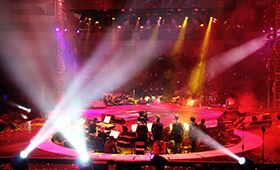Primed and ready for all aspects of show technology
Training for event engineering specialist updated
34/2016 | Bonn, 26.07.2016

They work where the events take place: at the event venues, on trade fair construction, in theatres and on production operations for radio, film and television. Event engineering specialists spend a lot of time on the road; they ensure that light, sound and images are right and that the systems, set-ups and procedures are designed and implemented. The updating of the three-year training now addresses the diverse innovations, for example in presentation, image and recording technology. The training regulation comes into force on 1 August 2016. This was updated on behalf of the Federal Government by the Federal Institute for Vocational Education and Training (BIBB) together with the social partners and experts from company practice.
The background to the revision is that the training regulations which have been in place since 2002 have become outdated. Technical innovations in stage, sound system and lighting technology have therefore now been incorporated in the training regulation. Far more importance is now attached to the use of media and presentation technology at events. We now take it for granted that graphics, logos and video sequences are integrated via the use of media in trade fairs, concerts and other events.
There is increasing clarity over the responsibilities allocated to the event engineering specialist in the area of energy supply. This might include planning the energy requirement, ensuring a proper set-up, and the operation and removal of non-stationary electrical systems.
Today the work is also much more project-oriented. Event engineering specialists should acquire the competence for planning project procedures in their own work area taking into account technical and organizational interfaces, for cooperating in the allocation of tasks and the deployment of personnel, for coordinating work procedures and for providing safety-related instruction to employees. When running events, they must also ensure that the process functions smoothly and that a range of solutions are developed quickly in the event of disruptions.
Over recent years, the number of young people commencing training as an event engineering specialist has been at a constant level of around 1,100 per year; just under 10% of these are women. Training companies require applicants to have knowledge of mathematics and physics for the profession. The English language also plays an important role in a business which is becoming increasingly international. Finally, applicants must also be willing to work in different locations and at unusual times and must also have teamwork skills and a customer focus.
Specialists who have completed their training work for radio stations and television broadcasters, for trade fair construction companies, technology service providers and theatres. The career prospects are good. Many event engineers also work on a freelance basis. A range of different career routes are also available. For example, a qualification as a master of event technology also allows you to design larger events, to run and monitor these, and to take on management tasks in the process.
Contact at BIBB:
Dr. Heike Krämer
Specimen copy requested if printed.